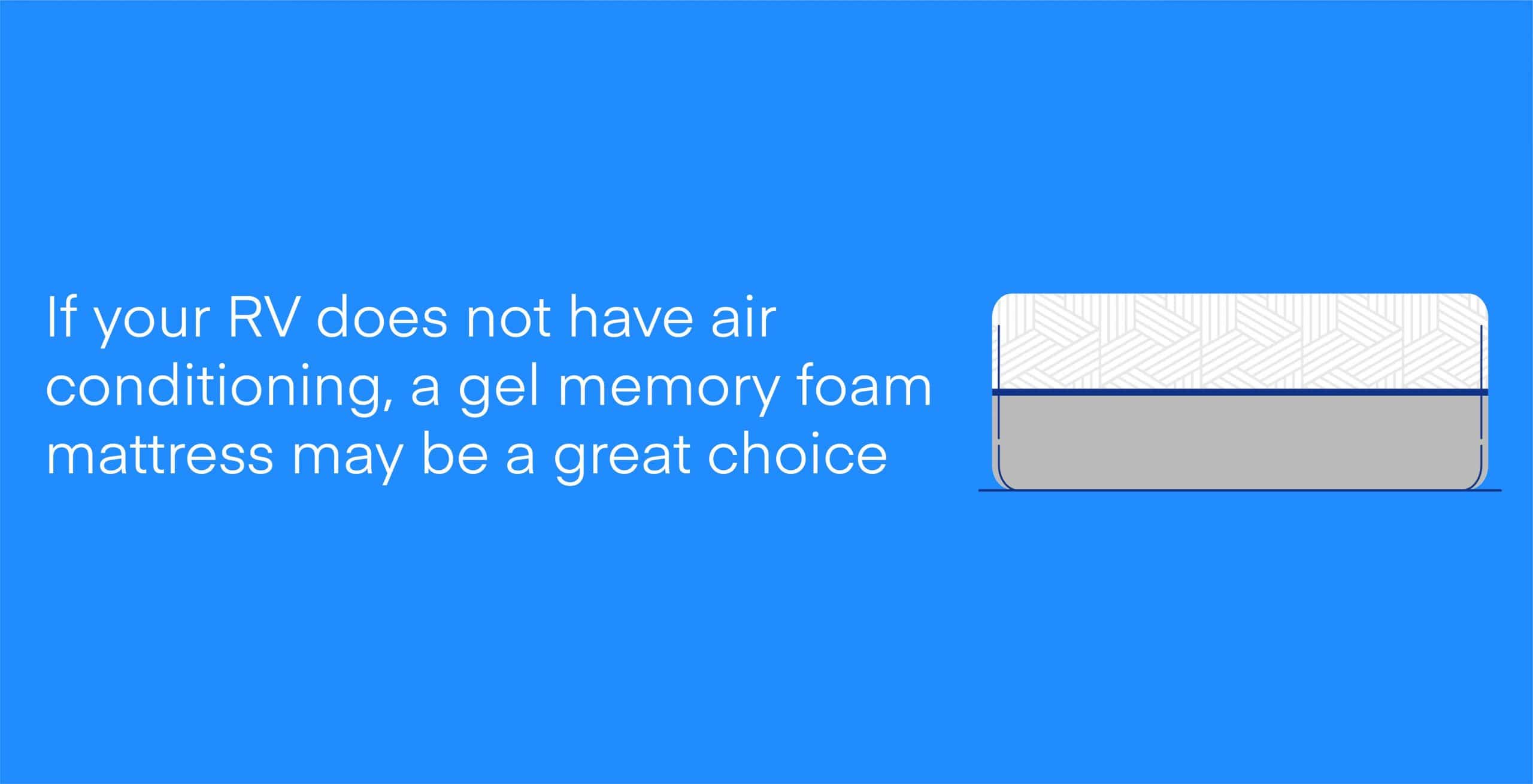Sleeping in an RV or a camper van may not be the most memorable part of camping, but sleeping well is important because sleep deprivation impacts driving. The regular mattresses that come along with your RV or camper may not be comfortable enough for a good night’s sleep.
Your mattress size and type affect your sleep quality. In this article, we discuss the different RV mattress sizes and types so you can choose the one best suited for you.
RV Mattress Sizes
You will be surprised to know there is a wide variety of RV mattress sizes available. Depending on the space in your RV, the number of campers, and their ages, you can choose one or more from the various options.
RV Twin Size Mattress
Twin beds are common in most small RVs and campers because they are a compact size that fit anywhere. Twin mattresses used in RVs are found in two sizes, measuring 28 inches by 75 inches and 28 inches by 80 inches. Depending on the available space inside your camper, you can choose one of these sizes. They can be placed side by side or as bunk beds if you have that option.
Truck Size Mattress
Truck size mattresses are named so because they are used in the cabs of semi-trucks, but this size can be used in campers, too. A truck size mattress measures between 35 inches by 79 inches and 42 inches by 80 inches. They are longer than most twins, making them perfect for tall sleepers.
Bunk Size Mattress
Bunk beds are a popular feature in many family-friendly RVs. They come in a combination of different sizes, depending on the space inside your RV. Some of the common RV bunk sizes are:
- RV Bunk: 28 inches by 75 inches
- RV Bunk: 30 inches by 75 inches
- RV Bunk: 30 inches by 80 inches
- RV Bunk: 34 inches by 75 inches
- RV Bunk: 35 inches by 79 inches
We suggest measuring the bunk beds in your RV before deciding on your mattress size.
Three Quarter Size Mattress
Three quarter size mattresses are smaller than full size mattresses but bigger than twins and bunk mattresses. They are commonly used in smaller RVs that don’t have enough space for a full size bed. The three quarter size mattress measures 48 inches by 75 inches and may accommodate two kids, depending on their ages.
RV Full or Double Size Mattress
RV full or double size mattresses measure 53 inches by 75 inches. They are an inch smaller in width than the regular full size mattresses used at home, and are commonly found in most RVs because they are comfortable for an adult sleeper.
Short Queen Size Mattress
The short queen mattress measuring 60 inches by 75 inches is 5 inches shorter than a regular queen size mattress. It’s perfect for accommodating two adult sleepers, without taking up too much space.
Queen Size Mattress
Short queen mattresses are much more common in RVs than standard queen size beds. Queen size beds measure 60 inches by 80 inches and are a better fit for your bedroom at home. If the bed platform in your RV is big enough for a standard queen, then you may use the queen mattress you have at home.
RV King Size Mattress
If your camper has the space, then RV king size mattresses are the perfect option for a big family. These measure between 72 inches by 75 inches and 72 inches by 80 inches. RV kings can easily accommodate a couple and a child, or four children. Some pop-up campers have the luxury to include two kings on either side, allowing a big fun family to sleep well while camping together.
Comparison of Different RV Mattress Sizes
Since space is limited in RVs and campers, even an inch matters, so RV mattresses come in a vast range of sizes. Some are good for individuals, while others are suitable for couples and families. Some cater to tall sleepers, while others have less legroom leaving more walking space. Prioritizing your needs is crucial while deciding on your RV mattress size.
| Mattress Size | Dimensions (Inches) | Dimensions (CM) |
|---|---|---|
| RV Twin | 28 inches by 75 inches to 40 inches by 80 inches | 71.12 cm by 190.5 cm to 71.12 cm by 203.2 cm |
| Truck | 35 inches by 79 inches to 42 inches to 80 inches | 88.9 cm by 200.66 cm to 106.68 cm by 203.2 cm |
| Bunk |
|
|
| Three Quarter | 48 inches by 75 inches | 121.92 cm by 190.5 cm |
| RV Full or Double | 53 inches by 75 inches | 137.16 cm by 190.5 cm |
| Short Queen | 60 inches by 75 inches | 152.4 cm by 190.5 cm |
| Queen | 60 inches by 80 inches | 152.4 cm by 203.2 cm |
| RV King | 72 inches by 75 inches to 72 inches by 80 inches | 182.88 cm by 190.5 cm to 182.88 cm by 203.2 cm |
RV Mattress Types
Once you have decided on the mattress size, it’s time to choose your preferred mattress type. RVs and campers usually come with foam mattresses, which are about 5 to 6 inches thick, and are not as comfortable as your home mattresses. But you have the option to replace these with regular memory foam, latex, or innerspring mattresses.
Memory Foam Mattress

Memory foam mattresses conform closely to the body and relieve pressure points and aches. They are usually priced between $400 to $1000, depending on the size and brand.
If you are visiting a hot and humid region, and your RV does not have air conditioning, a gel memory foam mattress may be an excellent choice. A cooling gel or gel beads are swirled in memory foam mattresses for better temperature regulation. You may also consider buying a memory foam or gel memory foam mattress topper if you don’t want to invest in a whole new mattress. Mattress toppers improve the feel of your bed, but they don’t last as long as a mattress.
Latex Mattress
Latex mattresses also contour to your body, but may not feel as plush as memory foam. However, an all-natural latex mattress is an eco-friendly option because it doesn’t contain chemicals. Latex mattresses are naturally hypoallergenic; they resist dust mites, mold, and mildew. However, they can be expensive, ranging between $900 and $1500.
Innerspring Mattress
Innerspring mattresses usually come with a pillow top comfort layer to cushion you from the springs. Though they may feel comfortable, they aren’t always suitable for RVs because unlike foam mattresses, innerspring mattresses have steel coils that may rust. If you are camping in a humid region, moisture in the air can cause rusting. Innerspring mattresses are not very expensive; they range from $250 to $600.
Air Mattress
Air mattresses are lightweight, an advantage in RVs, but they may not be comfortable for long-term use because they can’t provide sufficient support. Though air mattresses give you the option to adjust the firmness level, a tiny leak may damage your mattress. And while on the move and sleeping in your car or RV, you don’t want the hassle of fixing a mattress or finding a replacement. Their cost ranges between $100 and $1100.
Air mattresses and memory foam mattresses are both popular camping mattresses for different needs. Whether an air or foam mattress is right for you depends on whether you’re backpacking, tent camping, or car camping.
More Mattress and Bedding Size Guides
RV mattresses aren’t the only thing that comes in a range of specialty sizes.
- Mattress Sizes and Dimensions in Canada
- Bunk Bed Mattress Size Guide
- Hospital Bed Mattress Sizes and Dimensions
- Bed Sheet Sizes and Dimensions Guide
- Bed Frame Sizes and Dimensions Guide
- Mattress Protector Sizes and Dimensions Guide
- Adjustable Bed Sizes and Dimensions Guide
- Blanket Sizes and Dimensions Guide
- Murphy Bed Sizes and Dimensions Guide
- Bed Pillow Sizes Guide
- Headboard Sizes Chart and Dimensions Guide
- Pillowcase Sizes and Dimensions
- Mattress Foundation Sizes and Dimensions Guide
- Duvet Sizes and Dimensions Guide
- Comforter Sizes and Bedding Chart
FAQs
Can you put a regular mattress in an RV?
It depends on the size of the bed platform in your RV. If it’s the size of a standard household mattress, then you can easily use your home mattress inside your mobile home. However, bed platforms have different dimensions than the standard household mattresses.
Do RV mattresses have a specific thickness?
When exploring the mattress thicknesses available for RVs, it’s crucial to understand that slide-out beds in RVs specifically necessitate mattresses 5 or 6 inches thick. The unique design of these sleeping spaces typically can’t accommodate mattresses thicker than 6 inches due to space constraints. However, when it comes to regular RV beds, the flexibility is evident, allowing you to use mattresses of any thickness.
This adaptability provides you with more options to customize your sleeping comfort on the road, ensuring a restful experience during your travels.
What are the key factors while choosing an RV mattress?
Durability, weight, and affordability are three crucial factors to consider when investing in an RV mattress. Due to lack of space, you may use your mattress more often than in regular homes. You want it to be durable enough to double up as your sofa, dining table, workspace, or kids’ play area.
You don’t want to travel heavy, so a lightweight mattress is good for RVs. Since your mattresses get used more often in RVs than in regular homes, they may have to be changed frequently. It’s beneficial to opt for affordable (but good quality) mattresses so you don’t feel the pinch every time you have to change it.
Can you use regular blankets and sheets on RV mattresses?
If your RV mattress has the same dimensions as another standard mattress size, it’s fine to use regular blankets and sheets. For RV-specific mattress sizes, it’s better to look for blankets and sheets made for RV sizes, and you can typically find these at RV mattress retailers, camping stores, and sporting goods stores.
Are RV mattresses comfortable?
Your comfort in an RV bed depends on what type of mattress you have, its thickness, and its firmness. RV mattresses can be as comfortable as regular mattresses. If your RV bed isn’t great, it’s worth using a mattress topper over your bed or upgrading your bedding to get a better night’s sleep.
Conclusion
Whether you are full time RVing or camping with family once in a while, you want to sleep comfortably every night so you can wake up feeling refreshed. When choosing your RV mattress, space and weight management are crucial. It will be beneficial to consider factors such as available space, number of sleepers, mattress weight, durability, and quality.
About the author
Sanchita Sen is a full-time writer focusing on the sleep health and mattress industry. She is a former journalist who has written numerous articles on the healthcare sector. Some of the topics she has covered include how to lucid dream, fever dreams, melatonin for sleep, and best gel memory foam mattress. Sanchita holds a Master of Arts in Communications from Convergence Institute of Mass Media and Information Technology Studies. She is also a published author, who seeks inspiration from both real life and the world of fiction.
View all posts





